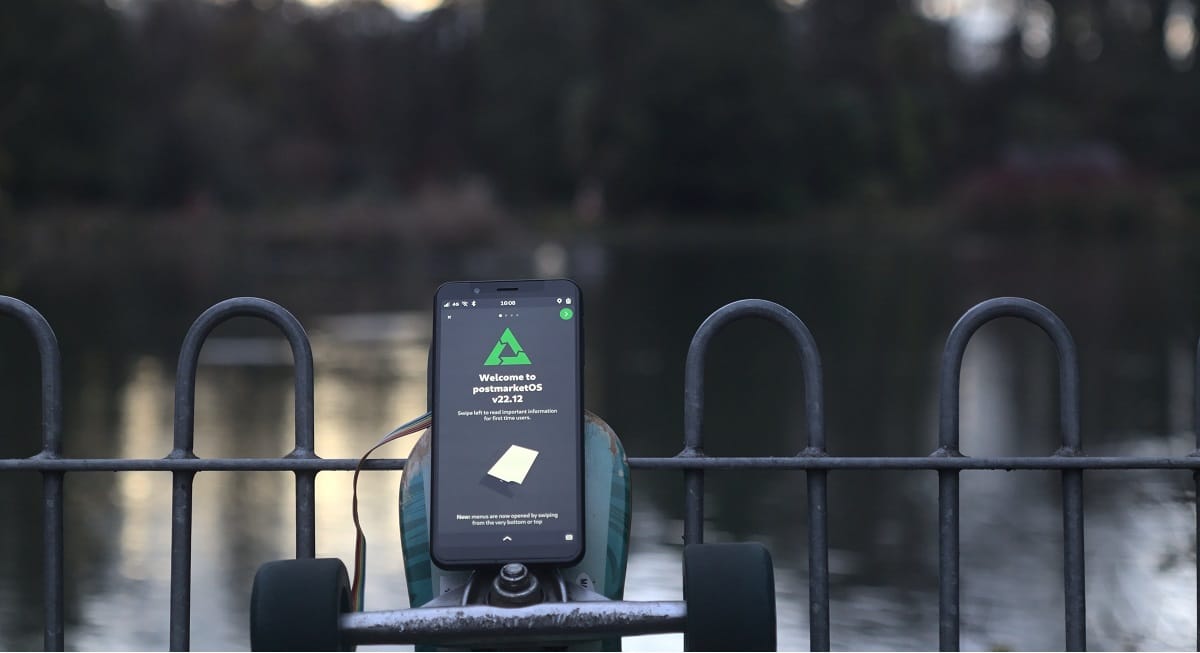
postmarketOS, is a free and open source software operating system in development primarily for smartphones and tablets, based on Alpine Linux.
The launch of the project has been publishedor postmarket OS 22.12, version in which various changes in the shell, environment, as well as improvements and some bug fixes have been highlighted.
The objective of the project is provide a linux distribution for smartphones that does not depend on the official firmware support life cycle and is not tied to the standard solutions of the main players in the industry that set the development vector.
The postmarket environmentOS is as unified as possible and puts all device-specific components in a separate package, all other packages are identical for all devices and are based on Alpine Linux packages.
Whenever possible, builds use the standard Linux kernel and, if this is not possible, firmware kernels prepared by device manufacturers. KDE Plasma Mobile, Phosh, and Sxmo are offered as the main user shells, but other environments are available, including GNOME, MATE, and Xfce.
Main novelties of postmarketOS 22.12
In this new version that comes from postmarketOS 22.12 the system base is in sync with Alpine Linux 3.17, along with whichl an experimental set of change was provideds to allow the use of a regular linux kernel, instead of an android kernel Manufacturer-specific, for devices based on the Qualcomm SDM845 (Snapdragon 845) SoC, such as OnePlus 6/6T, SHIFT6mq and Xiaomi Pocophone F1 smartphones.
Among the most notable improvements, we can highlight the expansion of functionalities and modernization of the design of the shell, the home screen and the interface for making calls. In the Plasma Mobile-based environment in postmarketOS, it was decided to remove Firefox from the base distribution, limiting itself to the QtWebEngine-based Angelfish browser offered in KDE Plasma Mobile.
In the graphical shell sexmo (Simple X Mobile), based on the Sway composite manager and adhering to the Unix philosophy, has been updated to version 1.12. The new version expands the possibilities associated with the use of device profiles (For each device, you can use different button layouts and activate certain features.) Adapted to work on OnePlus 6/6T, Pocophone F1, Samsung Galaxy S III, Samsung Galaxy Tab A 9.7 (2015) and Xiamo Redmi 2 devices. Improved Superd support for service management.
In addition to that in the environment phosh, (based on GNOME technologies and developed by Purism for the Librem 5 smartphone), has been updated to version 0.22, which features an updated visual style and redesigned buttons.
Of the other changes that stand out:
- In the battery charge indicator, the gradation of status changes is implemented in 10% increments, and notifications placed on the system lock screen allow the use of action buttons.
- Added the phosh-mobile configuration configurator and the phosh-osk-stub virtual keyboard debugging tool.
- New installations use gnome-text-editor instead of gedit as the text editor in a Phosh-based postmarketOS environment.
- Instead of proprietary drivers and user-space components, the open background process q6voiced, the QDSP6 driver, and the ModemManager/oFono-based stack are used to make calls.
- KDE Plasma Mobile skin updated to version 22.09; A detailed description of the changes since version 22.04 can be found in the 22.06 and 22.09 release notes.
- Finally it should be mentioned thatThe number of devices officially supported by the community increased from 27 to 31. Compared to version 22.06, support for PINE64 PinePhone Pro, Fairphone 4, Samsung Galaxy Tab 2 10.1 and Samsung Galaxy E7 smartphones was added.
If you are interested in knowing more about it, you can consult the details In the following link.
Download and get
Finally if you are interested in being able get this new version, you should know that builds are ready for PINE64 PinePhone, Purism Librem 5 and 25 community supported devices including Samsung Galaxy A3/A5/S4, Xiaomi Mi Note 2/Redmi 2, OnePlus 6, Lenovo A6000, ASUS MeMo Pad 7 and even Nokia N900. In addition, limited experimental support has been provided for more than 300 devices.